 Petzlover
PetzloverBelgian Shepherd Dog (Malinois) is originated from Belgium but Sulimov is originated from Russia. Belgian Shepherd Dog (Malinois) may grow 16 cm / 7 inches higher than Sulimov. Belgian Shepherd Dog (Malinois) may weigh 19 kg / 42 pounds more than Sulimov. Both Belgian Shepherd Dog (Malinois) and Sulimov has same life span. Both Belgian Shepherd Dog (Malinois) and Sulimov has almost same litter size. Belgian Shepherd Dog (Malinois) requires Low Maintenance. But Sulimov requires Moderate Maintenance
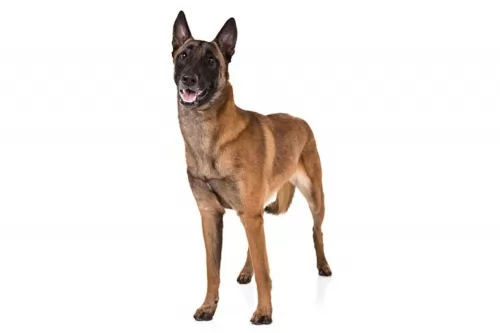 The Belgian Malinois is one of 4 Belgian Shepherd varieties. The dogs were developed- and hail from Belguim. The Malinois has a short, fawn colored coat. The American Kennel Club recognizes that the Malinois is a separate breed from the other 3 varieties. It was in 1892 that Professor Reul wrote the first Belgian Shepherd Dog standard, recognizing 3 varieties – dogs with short coats, dogs with long coats and dogs with rough coats.
The Belgian Malinois is one of 4 Belgian Shepherd varieties. The dogs were developed- and hail from Belguim. The Malinois has a short, fawn colored coat. The American Kennel Club recognizes that the Malinois is a separate breed from the other 3 varieties. It was in 1892 that Professor Reul wrote the first Belgian Shepherd Dog standard, recognizing 3 varieties – dogs with short coats, dogs with long coats and dogs with rough coats.
Today's Malinois goes back to a breeding pair owned by Adrien Janssens. It was in 1885 that he bought a fawn, rough-haired dog, breeding the dog with a short-haired dog named Lise de Laeken. After other breedings, the two dogs were recognized as ancestors of the modern Belgian Shepherd Dogs.
The city of Malines formed a club for the promotion of these fawn short hairs and the name Malinois became synonymous with them. In March 1992, the American Belgian Malinois Club received AKC parent club status.
This Russian jackal-dog-hybrid is thought to have developed from golden jackals and Lapponian Herders. In fact the dog was developed by a certain Klim Sulimov to be a robust security- and sniffer dog at Aeroflot, a Russian airline.
Jackals were used because it is believed that they have a better sense of smell than any domesticated dog there is. The Jackal can also perceive things at a distance. Later on, other dogs were also bred into the line, making it an intelligent dog with an excellent sense of smell.
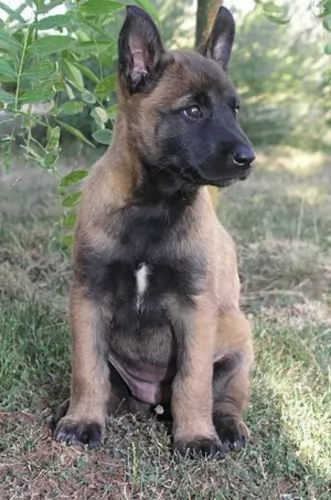 The Malinois is a medium-size Belgian shepherd dog. People sometimes mistake them for the German Shepherd as they are fairly similar to look at. The Malinois however is a smaller, lighter boned dog with naturally upright ears and a black-masked face. He is shorthaired and fawn-colored with black tips on the hairs, although other colors are brown or red too. He is an intelligent and active dog, always having been used for herding-, police- and rescue work.
The Malinois is a medium-size Belgian shepherd dog. People sometimes mistake them for the German Shepherd as they are fairly similar to look at. The Malinois however is a smaller, lighter boned dog with naturally upright ears and a black-masked face. He is shorthaired and fawn-colored with black tips on the hairs, although other colors are brown or red too. He is an intelligent and active dog, always having been used for herding-, police- and rescue work.
You’ll find the Malinois somewhat unpredictable as some are friendly and confident while other can be shy and withdrawn around strangers. This is a dog who loves to be around his human family, but to bring out the best in him, training and socialization classes will be necessary. Well-socialized Malinois are always good with children and other pets, more so if they’ve been raised with them.
Th Sulimov looks like, and also has characteristics of jackals and huskies. The body is large, the ears are triangular and erect, the eyes bright, alert and enquiring and the muzzle is long.
The legs of the dog are slim but strong, like the Jackal and the tail is long and bushy. The coat is fairly long, smooth and thick and can be in a range of colors such as tan, fawn, grey, white and black.
The Sulimov is a medium sized dog and stands at between 40 and 50cm in height and weighs between 12 to 15kg.
This hybrid dog is brave, confident, wily, robust, loving, affectionate and loyal. They are intelligent too and you won’t have any trouble training him.
The truth is, there isn’t much information on the personality of this breed, but they are eager to please, are full of energy and can be cheerful and feisty, even in extreme temperatures.
They’ve been bred for work and aren’t a typical family pet. Because of their wild side, they aren’t recommended for the first time dog owner or for a family pet where there are children.
If you were to keep one, it would be far better suited to life on a farm where it could have a role to play. Life in the city for this active hybrid is out of the question.
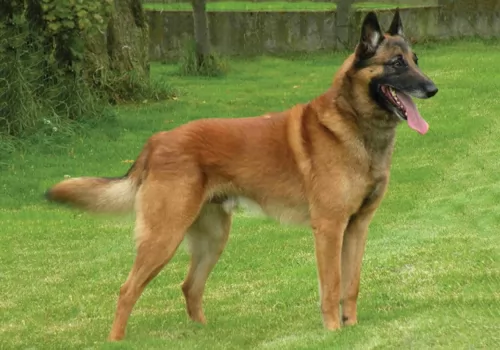 The Belgian Malinois makes a wonderful guard dog and he works hard to ensure that his human family, whom he adores, are well protected under his watch. They’re such intelligent dogs too that you may feel inclined to pass over some of your chores to him.
The Belgian Malinois makes a wonderful guard dog and he works hard to ensure that his human family, whom he adores, are well protected under his watch. They’re such intelligent dogs too that you may feel inclined to pass over some of your chores to him.
He responds well to training, and to get the best from this breed, start with training and socialization as soon as you bring your puppy home.
Socialization is excellent as it introduces your puppy to different people, animals as well as situations.
He is an adaptable dog and can live in an apartment if he is well exercised. He can be your devoted and loyal friend for a good number of years but you will have to do your part in providing him with the best care possible.
The Sulimov makes an excellent working dog and in fact he loves to be busy. They've got an unusual feature - their tails, which are normally curled up and over the back like a husky, hang down limply when tired. Their handler know when these dogs are ready to call it a day.
They are essentially working dogs, being loyal and devoted to their handlers, but wouldn't be considered as an ideal family pet.
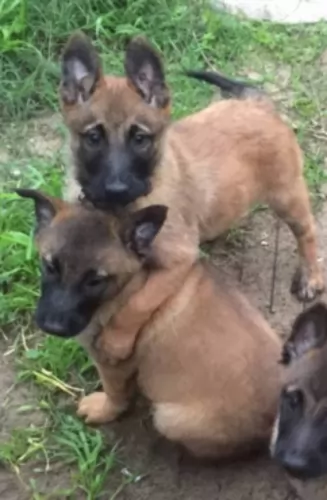 Belgian Malinois are generally healthy dogs. However every dog, regardless of breed, can pick up illnesses, and it is always wise to be aware of some of the diseases your Malinois might face.
Belgian Malinois are generally healthy dogs. However every dog, regardless of breed, can pick up illnesses, and it is always wise to be aware of some of the diseases your Malinois might face.
An inherited condition where the thigh bone doesn't fit properly into the hip joint. As the dog ages, arthritis can develop.
A degenerative eye disorder that can lead to blindness.
Brush his teeth at least 2 or 3 times a week to remove tartar build-up. Too much plague leads to inflamed gums, bad breath, pus inside the mouth and even loss of teeth.
There is ongoing debate about the health of hybrid dogs against that of purebred dogs. Hybrids inherit genetic dispositions that their parents would have, including certain heath issues.
Parasites are a huge cause of disease in dogs. Apart from ticks and fleas, internal parasites live inside the gastrointestinal tract and can be things like hookworms, tapewarms and roundwarms among others.
Parasites are usually transmitted when the dog ingests parasite eggs in contaminated water, food, feces or soil.
It’s important to get your dog treated as these parasites can cause weight loss, swollen abdomen, malnutrition, diarrhea, vomiting and anemia. Apart from this, they can affect people too. Fortunately these parasites are treatable and easy to prevent.
Other common dog ailments to look out for include bloat, obesity, cancer and hip dysplasia.
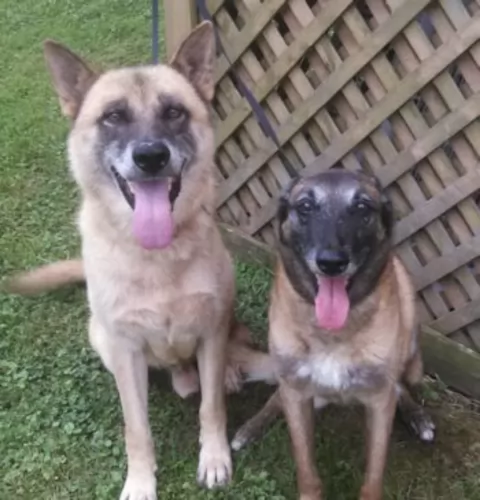 Because the Malinois is a constant shedder, with a couple of heavy shedding periods during the year, you’ll need to be conscientious with his grooming and brush him at least twice a week to get rid of loose hairs and to give his thick coat a glossy, healthy look to it.
Because the Malinois is a constant shedder, with a couple of heavy shedding periods during the year, you’ll need to be conscientious with his grooming and brush him at least twice a week to get rid of loose hairs and to give his thick coat a glossy, healthy look to it.
Because of their high energy, Malinois aren’t recommended for couch-potato type owners. It will be cruel to buy such a dog and to leave him to waste away with boredom and frustration in your back yard. He’ll want lots of rough and tumble, ball games, runs in the park or in the country and long walks.
Belgian Shepherd Malinois puppies are vulnerable when they’re tiny, and it would be wise to speak to your vet about superb nutrition to build up a puppy’s immune system.
An excellent way to ensure the health of your growing Malinois is to give him a home prepared meals along with commercially manufactured food recommended by your vet. You can’t just put a bowl of commercially manufactured dog food in front of him day after day month after month.
Apart from what your vet recommends, give him some brown rice, some cooked vegetables and some raw meat. Raw meat will ensure he can fight of skin infections. The age of the dog, emotional state and environmental influences can all play a role in skin diseases with dogs, but by ensuring some raw meat in his diet, the immune system is strengthened and skin disorders are eliminated. Always ensure a steady supply of fresh water.
This is a medium sized dog so you can buy a high quality dry kibble for him manufactured for medium sized energetic dogs.
Try and avoid the low quality dog foods which come with lots of ingredients that are plain ordinary bad for your dog, and can jeopardize his health.
Try and feed him some home-made food too – boiled chicken, brown rice or pasta and some nutritious vegetables such as spinach,sweet potatoes and carrots. Chop it all up and add some of it to the dry kibble twice a week.
You can also provide him with some raw fish and raw red meat occasionally as this keeps the skin and coat healthy. Make sure he always has fresh, cool water available.
Have him trained and socialized. As it is, for the job he does as a security dog, he is trained and socialized.
Provide him with lots of exercise – walks, ball games, exercises that stimulate mind and body.